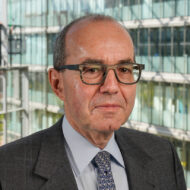Delivering innovation for global health security

Date
19 September 2023
Time
18:00 - 20:00 EDT
Hosts
IFPMA
Location
Harvard Club
35 West 44th Street
New York, NY 10036
Attendance
This event has now passed. To browse our upcoming events click here.
How can innovation be at the heart of our plans to strengthen global health security?
With a focus on three global health topics – pandemic prevention, preparedness and response, universal health coverage, and tuberculosis – at UNGA78, IFPMA hosted a side event featuring insights from leading figures who are at the center of steps to deliver innovation for global health security.
This in-person event brought together senior representatives from governments, multilateral organizations, and the private sector.
Missed the event? Rewatch the recording below.
Address
Harvard Club (Cambridge Room)
35 West 44th Street,
New York, NY 10036
Program
Speakers

Kolinda Grabar-Kitarović was the fourth President of Croatia (2015-2020), a role which she was the first woman to hold. Over her lengthy career in public service, she was elected a Member of the Croatian Parliament (2003) and served as Croatia’s Minister of Foreign Affairs (2003-2008), again becoming the first woman to serve in the position. She also served as Ambassador to the United States, co-accredited to Mexico, Panama, and the Organization of American States (2008-2011), and was also the first female Assistant Secretary General and member of the North Atlantic Treaty Organization (NATO) Senior Leadership (2011-2014).
In addition to serving as GPMB co-Chair, Ms Grabar-Kitarović is a Women Political Leaders (WPL) Global Ambassador for Immunization, a Member of the High-Level Advisory Council for the High Representative for the UN Alliance of Civilizations, and Chair Emerita of the Council of Women World Leaders. She is currently an Executive in Residence at the Zagreb School of Economics and Management and serves on the boards of several non-profit institutions, including the US Atlantic Council, Halifax International Security Forum, Concordia Leadership Council, GLOBSEC, and Friends of Europe. She was elected as an Independent Member of the International Olympic Committee in 2020 and has been appointed Chair of the Future Hosts Commission for the Games of the Olympiad. She is also a Member of the Nizami Ganjavi International Centre.
Ms Grabar-Kitarović was previously a visiting fellow at the Sine Institute of Policy and Politics at American University in 2021, and the Nanovic Institute for European Studies at the University of Notre Dame in October 2022. Parallel to her diplomatic and political careers, she has pursued an academic career in government, international relations, and security studies at the Vienna Diplomatic Academy (1994-1995), George Washington University (2002-2003), Harvard University (2009), Johns Hopkins University (2011), and the University of Zagreb. She is a recipient of the 2019 Fulbright Lifetime Achievement award for her “remarkable contributions as a leader, diplomat, and public servant”, the George Washington University President’s Medal, and several other national and international awards, decorations, recognitions, honorary doctorates, and honorary citizenships.

As Chairman and Chief Executive Officer, Albert Bourla leads Pfizer in its purpose, “Breakthroughs that change patients’ lives,” with a focus on driving the scientific and commercial innovation needed to have a transformational impact on human health.
During his more than 30 years at Pfizer, Albert has built a diverse and successful career, holding several senior positions across a range of markets and disciplines. The global nature of his work— having lived and worked in nine different cities and led teams across five continents—has informed his understanding of the needs of patients and healthcare systems around the world and deepened his commitment to helping ensure equitable access to medicines and vaccines.
When he took the reins as CEO in January 2019, Albert accelerated Pfizer’s transformation to become a more science-driven, innovative company—divesting its non-science-based businesses and dramatically increasing its R&D and digital innovation budgets. To create a culture in which the company’s people and science could thrive, Albert and his leadership team established Pfizer’s Purpose Blueprint, which included four core values: courage, excellence, equity, and joy.
A powerful example of Pfizer’s capabilities and culture was seen in the company’s response to the COVID-19 pandemic. Refusing to accept public funding and instead investing more than $2 billion dollars at-risk, Albert inspired colleagues to deliver a safe and effective vaccine in just eight months —a process that typically take 8-10 years—without compromising quality or integrity. A year later, continuing to move at the speed of science, Pfizer delivered the first FDA-authorized oral antiviral treatment for COVID-19 by implementing the same sense of urgency and new ways of working that had made the vaccine program so successful. The company is now applying many of these “lightspeed” principles to projects across a wide range of therapeutic areas, including cancer, cardiovascular disease, inflammatory conditions, and more. Albert wrote about the company’s experience developing a COVID-19 vaccine in his book, Moonshot: Inside Pfizer’s Nine-Month Race to Make the Impossible Possible, which was a Bronze Medalist in the 2023 Axiom Awards and a Finalist for the National Jewish Book Awards. The book also appeared on the Wall Street Journal Bestseller list for four weeks and was selected by the Next Big Idea Book Club.
Under Albert’s leadership, Pfizer also has further strengthened its commitment to Environmental, Social and Governance (ESG) principles. This includes issuing the biopharmaceutical industry’s first Sustainability Bond addressing capital investments in both environmental and social initiatives; launching the company’s first ESG report; and completing an extensive priority issue assessment to confirm where and how Pfizer can have the greatest long-term impact.
Albert is a Doctor of Veterinary Medicine and holds a Ph.D. in the Biotechnology of Reproduction from the Veterinary School of Aristotle University. He has received honorary doctorates from the American College of Greece, the University of Patras, Touro University, The Technion-Israel Institute of Technology, and Aristotle University, as well as an honorary degree from Babson College.
In 2022, Albert received the Golden Cross Order of the Redeemer, conferred by the President of Greece; the Order of Boyacá, conferred by the President of Colombia; and the Order of the Independence from the First Degree, conferred by His Majesty King Abdullah II of Jordan. In the same year, he was named the 2022 Genesis Prize Laureate in recognition of his leadership during the COVID-19 pandemic and received the Courage Against Hate Award from the Anti-Defamation League. He also received the 2022 Eisenhower Global Citizenship Award from the Business Council for International Understanding, the Distinguished Leadership Award, and the Peter G. Peterson Business Statesmanship Award from the Committee for Economic Development, the Gold Medal from Americas Society, the Bower Award in Business Leadership from The Franklin Institute, the Double Helix Award from Cold Spring Harbor Laboratory, the Humanitarian Award from the Simon Wiesenthal Center, and the Manufacturer of the Year from the National Association of Manufacturers’ Leadership Council.
In 2021, he was named CEO of the Year by CNN Business, included in Insider Magazine’s Most Transformative CEOs list and inducted into the Crain’s New York Business 2021 Hall of Fame. That same year, he received the Appeal of Conscience Award in recognition of his extraordinary leadership in service of the global community and The Atlantic Council’s Distinguished Business Leadership Award for his and Pfizer’s work on the COVID-19 vaccine. He also was recognized with the Roy Vagelos Award from the Prix Galien Foundation, the Academy of Achievement Award in Science from AHEPA, the Golden Medal of Institution from Hellenic Open University, the David Rockefeller Award from the Museum of Modern Art, the Theodor Herzl Award from the World Jewish Congress, the Sparkle of Hope Award from Community Hope, and the Father of the Year Award from the National Father’s Day Council. In 2020, he received the Meridian Global Leadership Award.
Albert is chairman of The Pfizer Foundation and Co-Chair of the Board of Directors for the Partnership for New York City. He is President of the International Federation of Pharmaceutical Manufacturers & Associations, a director on multiple boards—Pfizer Inc., PhRMA and Catalyst—and a trustee of the United States Council for International Business. In addition, Albert is a member of the Council on Foreign Relations, the Business Roundtable, the Business Council, and the New York City Mayor’s Corporate Council.

Thomas Cueni has led IFPMA since 2017, during which time he has been instrumental in establishing cross sectoral programs designed to tackle the biggest global health challenges.
This includes establishing the $1bn AMR Action Fund to support the development of new antibiotics; as Chair of the AMR Alliance; as a member of the Board of City Cancer Challenge; and as the industry’s representative on the Access to COVID-19 Tools (ACT) Accelerator.
Leading the IFPMA through the COVID-19 pandemic, Thomas galvanised the industry to develop the Berlin Declaration – the pharmaceutical industry’s blueprint to deliver equitable access to vaccines, treatments, and diagnostics in future pandemics. Thomas is Chair of the Business at OECD Health Committee and serves as Industry Co-Chair of the APEC Biopharmaceutical Working Group on Ethics. He is also a member of the Business Advisory Group established by the Director General of the World Trade Organization.
Prior to joining IFPMA, Thomas was Secretary General of Interpharma, the trade association representing Switzerland’s research-based pharmaceutical industry; Secretary of the Dolder Group, precursor of what’s now the BCR; and served on the Board of the European Federation of Pharmaceutical Industries and Associations (EFPIA). Thomas began his career as a journalist, as London correspondent for the Basler Zeitung and Der Bund, before serving as a Swiss diplomat in Paris (OECD) and Vienna (IAEA, UNIDO).
Thomas has a master’s degree in economics from the University of Basel and another in politics from the London School of Economics. He also studied at the Geneva Graduate Institute for International Studies.

Maggie Fox is an award-winning journalist with more than 40 years experience reporting from around the world. She’s worked for Reuters, CNN, NBC, ABC, National Journal and various newspapers, reporting from Asia, the Middle East, Europe, and, for the past 25 years, on medicine, science, and global health from Washington, DC.
Maggie hosts the One World, One Health podcast for the One Health Trust and is a contributing reporter to The Fuller Project.
Maggie started her career in radio in South Carolina, covering the most local of news before joining ABC radio in New York. She moved to Beirut, Lebanon to work as a radio and newspaper reporter, specializing in covering conflicts and political developments in the region. From her next base in Hong Kong, she covered political changes in the Philippines, South Korea and events in China, including the Tiananmen Square demonstrations.
She joined Reuters in London, covering the breakup of the former Yugoslavia, political talks in Northern Ireland, as well as financial regulation and the British royal family before establishing a beat specializing in health and science news. After moving to Washington, Maggie hired and led a team of global reporters covering health and science for the news agency. She’s written about pandemic preparedness, AIDS, stem cell science, the sequencing of the human genome, cancer and heart disease as well as space discoveries.
At National Journal, Maggie set up and led teams covering technology and health care, before moving to NBC News to write about health. Most recently, she joined CNN’s health team to cover the COVID pandemic and helped WebMD and Medscape set up coverage dedicated to long COVID.
Resources
Statement at the High-Level Meeting on Pandemic Prevention, Preparedness and Response
On 20 September 2023, IFPMA submitted a statement at the UN High-Level Meeting on Pandemic Prevention, Preparedness, and Response in New York.
Read moreStatement at the High-Level Meeting on Universal Health Coverage
On 21 September 2023, IFPMA submitted a statement at the UN High-Level Meeting on Universal Health Coverage in New York.
Read moreStatement at the High Level Meeting on Tuberculosis
On 22 September 2023, IFPMA submitted a statement at the High-Level Meeting on Tuberculosis in New York.
Read more











